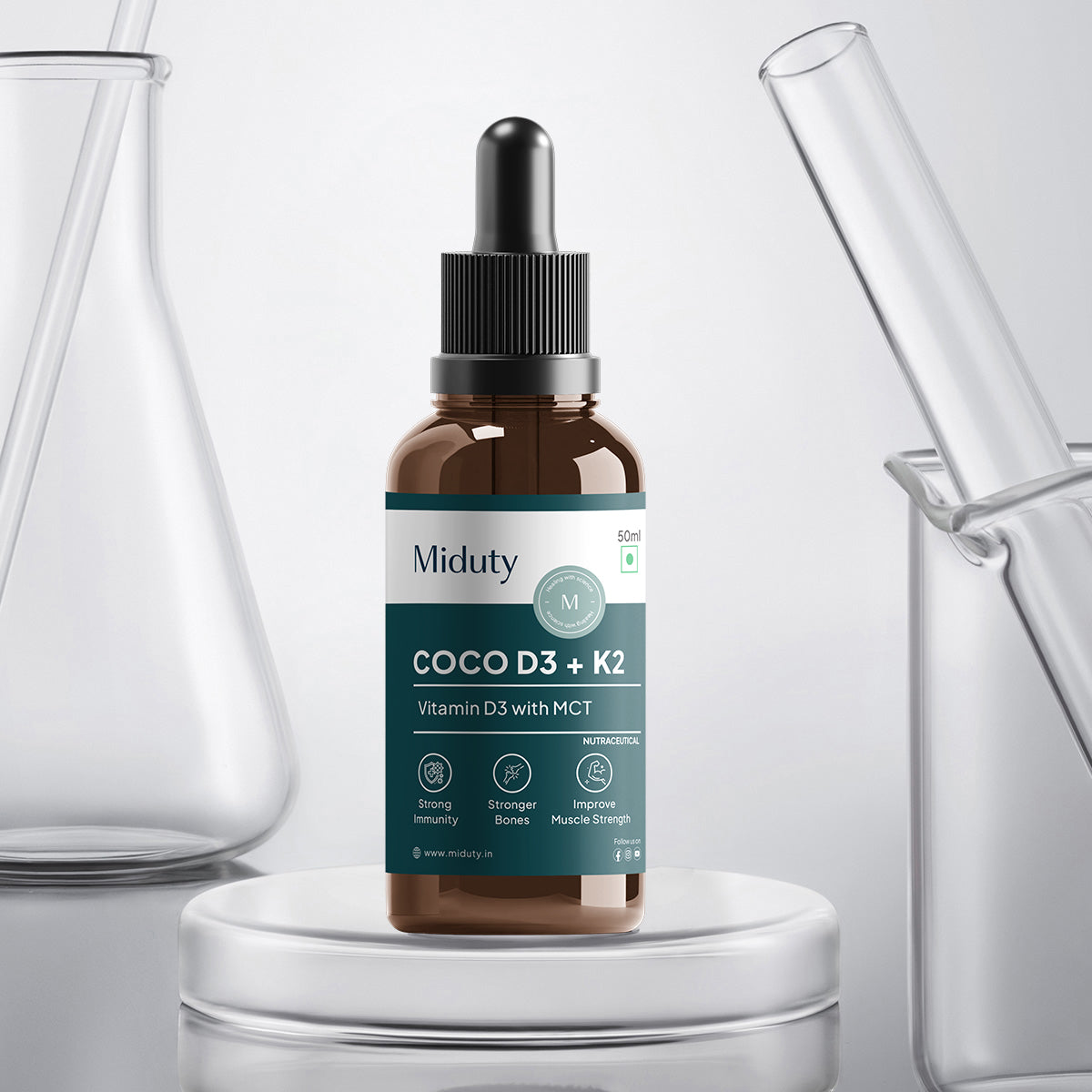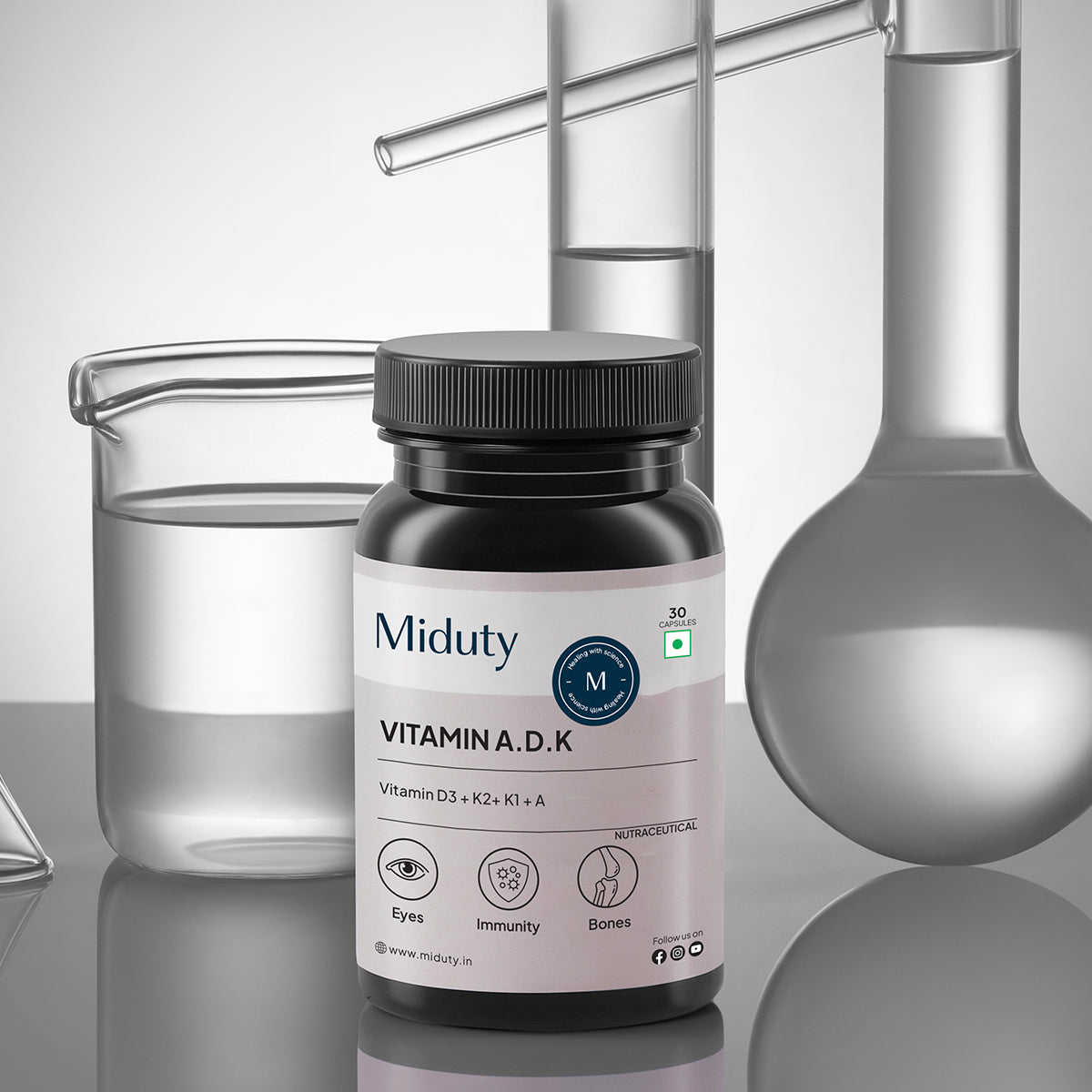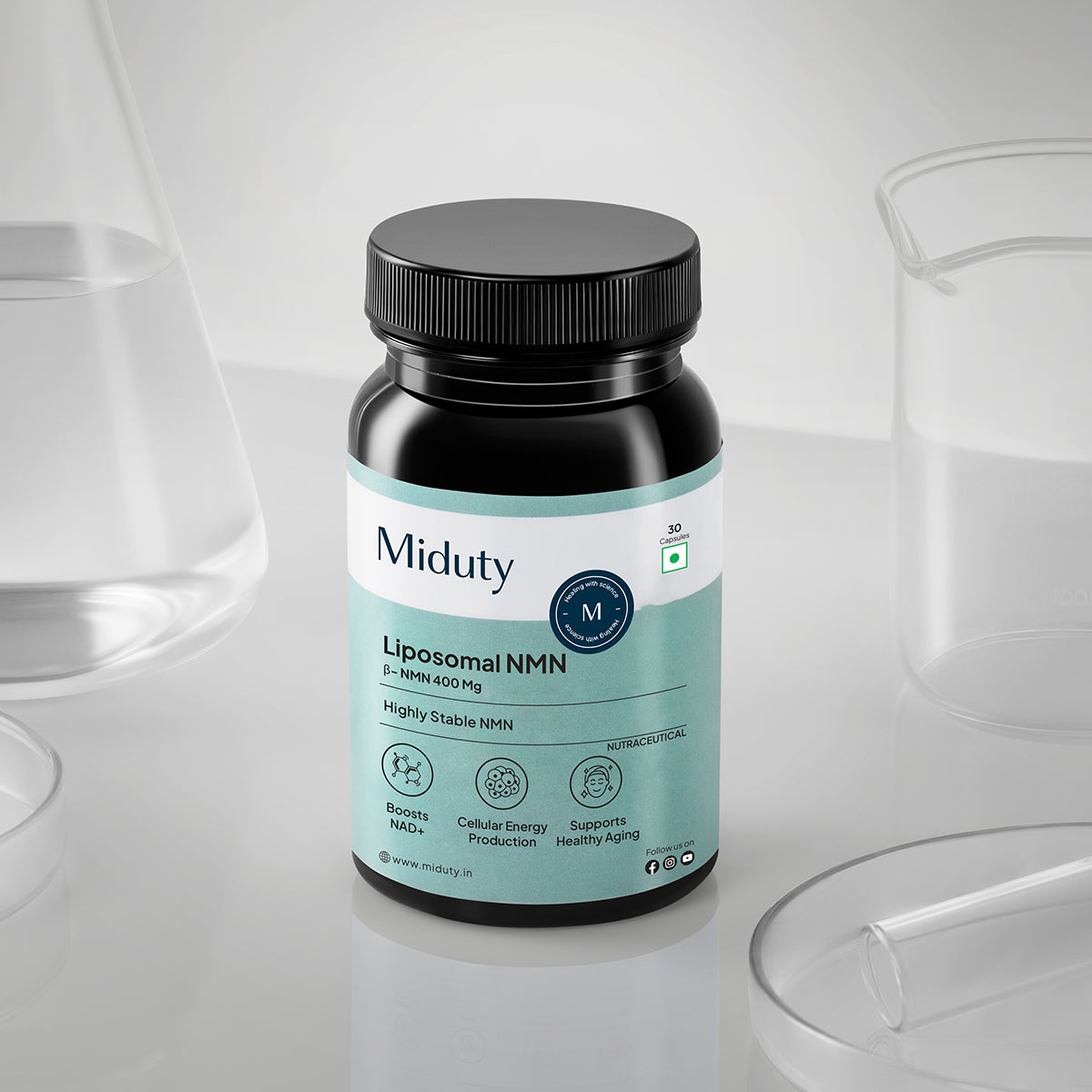
What Are The Benefits of Vitamin D3 and K2?
When people think of essential vitamins, they often picture Vitamin C for immunity or calcium for bone strength. But two fat-soluble vitamins — Vitamin D3 and Vitamin K2 — are finally getting the spotlight they deserve. While both are powerful on their own, together they form a synergistic duo that supports not just bone health, but also heart function, metabolism, energy, and even weight management.
In this article, we'll explore what Vitamin D3 and K2 are, why they're important, and the powerful benefits they provide when taken together.
Key Takeaways
1. The Sunshine & Synergy Duo – Vitamin D3 absorbs calcium, and Vitamin K2 directs it, keeping bones strong and arteries clear.
2. Beyond Bones – Together, D3 and K2 boost immunity, protect the heart, balance hormones, and sharpen metabolism.
3. Fat-Burning Allies – This vitamin pair improves insulin sensitivity and mitochondrial function, helping your body burn energy more efficiently.
4. Inflammation Fighters – D3 and K2 calm chronic inflammation, paving the way for easier weight management and long-term wellness.
5. Smart Supplement Strategy – Getting enough from diet alone is tough, but high-quality D3 + K2 supplements ensure the perfect balance for lifelong health.
What Is Vitamin D3?
Vitamin D3, also known as cholecalciferol, is often referred to as the "sunshine vitamin" because it's produced in the skin when exposed to sunlight. Unlike many other vitamins that act as co-factors, D3 functions more like a hormone, influencing the activity of over 200 genes in the body.
While best known for its role in calcium absorption and bone health, Vitamin D3 also plays a crucial role in:
- Supporting the immune system
- Regulating mood and brain health
- Influencing fat metabolism and insulin response
- Reducing inflammation
Sources of Vitamin D3 include fatty fish (salmon, mackerel, sardines), egg yolks, fortified foods, and sunlight. However, many people remain deficient, especially in areas with limited sun exposure.
What Is Vitamin K2?
Vitamin K2, or menaquinone, is part of the Vitamin K family. Unlike Vitamin K1 (which mainly supports blood clotting), K2 is responsible for directing calcium to the right places in the body — into bones and teeth, and away from arteries and soft tissues.
Vitamin K2 is found in foods like:
- Natto (fermented soybeans — the richest source)
- Aged cheeses
- Grass-fed butter and meats
- Fermented foods like sauerkraut and kimchi
Its unique role in calcium regulation makes it a powerful partner to Vitamin D3. Without enough K2, calcium absorbed with the help of D3 can sometimes end up in the wrong places, such as blood vessels, potentially leading to calcification.
What Are the Benefits of Vitamin D3?
1. Strengthens Bones and Teeth
Vitamin D3 helps the body absorb calcium from food and supplements. Without it, even high calcium intake won't be effective. Stronger bones and teeth mean a lower risk of osteoporosis, fractures, and dental problems. [1]
2. Boosts Immunity
D3 activates immune cells that fight infections. Research shows that people with sufficient Vitamin D levels are less likely to experience frequent colds, flu, or respiratory infections.
3. Supports Mood and Mental Health
Low Vitamin D3 levels are linked to depression, seasonal affective disorder (SAD), and fatigue. Adequate levels support neurotransmitter function, stabilizing mood and improving energy. [2]
4. Improves Insulin Sensitivity
By supporting healthy insulin release and sensitivity, Vitamin D3 may reduce the risk of type 2 diabetes and aid in weight management.
5. Reduces Inflammation
Chronic low-grade inflammation is linked to obesity, heart disease, and autoimmune conditions. Vitamin D3 helps regulate inflammatory pathways, improving long-term metabolic health.
What Are The Benefits of Vitamin K2?
1. Directs Calcium to the Right Places
K2 activates proteins (like osteocalcin) that bind calcium to bones and teeth, while preventing it from accumulating in arteries or kidneys. This lowers the risk of osteoporosis and arterial calcification. [3]
2. Protects Heart Health
By preventing calcium buildup in arteries, K2 lowers the risk of stiffened arteries, high blood pressure, and cardiovascular disease.
3. Enhances Bone Strength
Studies show K2 supplementation improves bone mineral density, especially in postmenopausal women who are at higher risk of osteoporosis.
4. Supports Hormonal Balance
K2 may influence hormones like insulin and adiponectin (linked to fat metabolism). This means it may play a role in improving energy use and preventing unnecessary fat storage.
5. Improves Mitochondrial Function
K2 helps support the mitochondria — the "powerhouses" of cells — allowing the body to produce energy more efficiently and burn fat as fuel. [4]
Why Vitamin D3 and K2 Work Better Together

Individually, both vitamins are powerful. But together, they create a synergistic effect that maximizes benefits and reduces risks.
-
D3 increases calcium absorption.
-
K2 ensures calcium goes to bones and teeth, not arteries.
Without K2, excess calcium from D3 supplementation could potentially deposit in the wrong places, stressing the cardiovascular system. With both, the body achieves a healthy balance that supports bones, metabolism, and heart health.
Key Benefits of Combining Vitamin D3 and K2
1. Stronger Bones and Teeth
Together, D3 helps absorb calcium, and K2 ensures it strengthens bones and teeth. This dual action reduces osteoporosis risk and supports long-term skeletal health.
2. Better Heart Health
The D3 + K2 duo prevents calcium from hardening arteries, reducing the risk of heart disease, strokes, and high blood pressure.
3. Enhanced Metabolism and Weight Management
Both vitamins support insulin sensitivity, fat metabolism, and mitochondrial function — making the body more efficient at using energy and less likely to store fat.
4. Reduced Inflammation
Chronic inflammation blocks fat-burning signals and contributes to disease. D3 and K2 work together to calm inflammation, supporting better metabolic health.
5. Long-Term Health Protection
Beyond weight and energy, the combination protects against osteoporosis, cardiovascular disease, and metabolic syndrome — making it a long-term investment in overall wellness.
How to Get Vitamin D3 and K2
1. Natural Sources
-
Vitamin D3: Sunlight, fatty fish, egg yolks, fortified dairy or plant-based alternatives.
-
Vitamin K2: Natto, aged cheeses, grass-fed butter, organ meats, fermented foods.
2. Supplementation
Because it's challenging to consistently get enough D3 (especially without sunlight) and K2 (which is scarce in most diets), supplementation is often the easiest way to maintain healthy levels.
3. Tips for Choosing a Supplement
- Look for Vitamin D3 (cholecalciferol) and Vitamin K2 (MK-7 form) for best absorption and longer-lasting effects.
- Typical doses: 1,000–5,000 IU of D3 and 90–200 mcg of K2 (MK-7) daily.
- Choose high-quality, third-party-tested supplements that are free from unnecessary fillers.
Lifestyle Habits That Enhance D3 + K2 Benefits
1. Get Sunlight – Aim for 15–20 minutes of sun exposure several times per week.
2. Eat a Whole-Food Diet – Include fatty fish, eggs, and fermented foods.
3. Exercise Regularly – Strength training and cardio improve bone density and insulin sensitivity.
4. Avoid Excess Calcium Supplements – Too much calcium without enough K2 may stress the arteries.
5. Maintain a Healthy Weight – D3 and K2 work best alongside balanced diet and lifestyle practices.
Conclusion
Vitamin D3 and K2 are often overlooked but play an essential role in overall health. D3 ensures calcium and nutrients are absorbed, while K2 directs them to the right places. Together, they strengthen bones and teeth, protect the heart and arteries, support metabolism and weight management, reduce inflammation, and boost long-term wellness.
For those aiming not only to lose weight but also to build a strong foundation for lifelong health, the D3 + K2 combination is a powerful ally. Whether through sunlight, diet, or high-quality supplements, making these vitamins part of your daily routine can transform your health from the inside out.
FAQ's on Benefits of Vitamin D3 and K2 -
1. What are the benefits of Vitamin D3 and K2 together?
Taking Vitamin D3 and K2 together offers powerful support for both bone and heart health. Vitamin D3 boosts calcium absorption, while Vitamin K2 ensures that calcium is deposited in bones and teeth rather than soft tissues like arteries. This synergy not only strengthens the skeletal system but also lowers the risk of arterial calcification, helping maintain a healthy cardiovascular system.
Q2 - What happens if you take Vitamin D3 and K2 every day?
Taking Vitamin D3 and K2 daily can support bone and heart health by enhancing calcium absorption and guiding it into bones, while preventing harmful buildup in arteries.
Q3 - Do vitamin D3 and K2 lower blood pressure?
Vitamin D3 and K2 may support healthy blood pressure, but the benefits appear strongest in people with a deficiency in vitamin D or both vitamins. While vitamin D contributes to blood pressure regulation and may lower risk in deficient individuals, supplementation does not consistently reduce blood pressure in the general population.
Q4 - Is it safe to take D3 & K2 long-term?
Long-term use of vitamin D3 and K2 is generally safe when taken at appropriate doses and may support bone and heart health by helping calcium move into bones rather than arteries. However, it's important to seek medical guidance on the right dosage and duration, since excessive vitamin D can raise calcium levels and cause harmful effects.
Q5 - Can D3 and K2 affect sleep?
Vitamin D3 and K2 may affect sleep, as vitamin D receptors are present in brain regions involved in sleep regulation, and deficiency has been linked to sleep disturbances. For some people, taking vitamin D later in the day may interfere with melatonin production and disrupt sleep, while others report improved sleep quality with supplementation.
References














